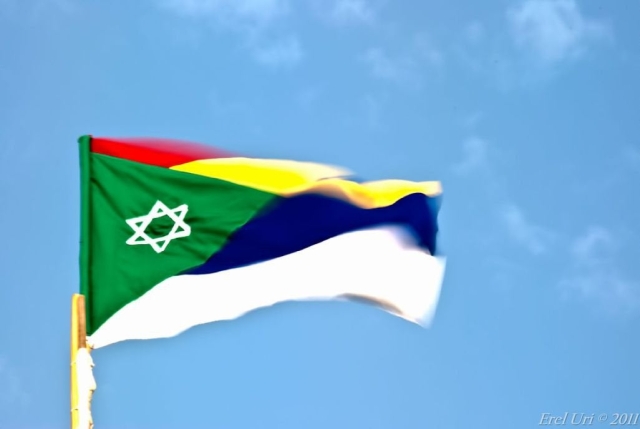On the international stage, Israeli news has a prominent spot, and sadly, most of it is not always in a positive light. If you type in Israeli news into Google you will likely find articles that pick sides in the Israeli-Palestinian conflict, write about the Iranian threats, and perhaps some political updates regarding the upcoming elections. What you will never find is news regarding the diverse demographics of Israeli society. One of the most important minority populations embedded into Israel and forever loyal to the Zionist state is the Druze.
Druze people are an Arabic, non-Muslim, group of people living all around the Levant, but mostly in Israel, Syria and Lebanon.
The Druze faith originated in Egypt as an offshoot of a sect of Islam called Ismaʿīlī Shīʿism, dating back to the 10th century. During the reign of the sixth Fāṭimid caliph, al-Ḥākim bi-Amr Allāh, some Ismaʿīlī theologians began to organize a movement proclaiming al-Ḥākim a divine, godly-like, figure. Although the idea was likely encouraged by al-Ḥākim himself, it was condemned as heresy by the Fāṭimid religious establishment, which held that Al-Ḥākim and his predecessors were divinely appointed but not holy in any way themselves. In 1017 the doctrine proclaiming Al-Ḥākim divinity was publicly preached for the first time, causing riots in Cairo.
#Jewish IDF soldiers and #Druze IDF soldiers dance together . #Israel #IDF pic.twitter.com/tNRBVbFecB
— Liron Diaz (@LironDiaz) September 23, 2022
Due to ongoing persecution, the Druze faith eventually died out in Egypt but survived in mountainous areas of the Southern Levant, where missionaries had established significant communities. The various Druze doctrines were written until 1043, after that the faith was sealed and all conversions into it were forever forbidden. Until this very day, conversions are not permitted, marriages outside of the community are extremely rare and the deepest secrets of this mysterious faith remain undisclosed even amongst most Druze.
During Ottoman rule in the land of Israel, Druze communities were permitted to practice their religion freely and run their towns with relative autonomy. High taxes were always a burden and the occasional riot led by Druze leaders would break out.
#Jewish IDF soldiers and #Druze IDF soldiers dance together . #Israel #IDF pic.twitter.com/tNRBVbFecB
— Liron Diaz (@LironDiaz) September 23, 2022
The Druze do not have a specific country and are traditionally aligned to the state of their birth. Generally speaking, Druze settle and become comfortable with an established government that best suits their needs, in this case, Israel.
In 1942, the Arab-Sunni leadership in Jerusalem declared their intentions of taking over the tomb of Jethro, a sacred place for the Druze. This huge mistake by the Muslim leadership in the British Mandate of Palestine cost them a great and loyal ally. With the declaration of the State of Israel in 1948, the Druze joined the Israeli forces in fighting off the enemy on all fronts.
🍴 Name: Nahala BaTeva - Traditional Druze hospitality
— מסעדה אקראית (@israel_diner) September 26, 2022
⭐️ Google Rating: 4.3 (473)
💵 Price: 💰💰
📍 Address: ישראל
🔗 https://t.co/oSHjmo8u6H pic.twitter.com/jl8Zfm7Ugw
Since then, the Druze have fought for Israel in every war the Jewish state has had and they are the only Arabic population in Israel that joins the IDF virtually at the same rate as Jews do. They have become a significant part of Israeli culture, with MK members on all political sides and high-ranking IDF officers that protect the Israeli borders.
The educated know Palestinians lie. They lie about everything & anything.
— Phillip Pasmanick (@PhillipInIsrael) September 23, 2022
To the educated, the list of what Apartheid is, is unnecessary since ALL ISRAELIS, Arabs, Bedouin, Druze, Christians & Jews all have equal rights & freedoms, that's obvious to see should they visit Israel. pic.twitter.com/Qvnp1RZnWw
Most Druze in Israel are Israeli citizens. The only area with lower citizenship rates is the Golan Heights. Since the Golan was only annexed into Israel from Syria in the early 80s, some of the local Druze populations still remain loyal to the Syrian regime. However, even within those communities, strong anti-Israeli sentiment is extremely rare.
Perhaps the reason for the surprising love between The Jews and Druze goes back to the Arab mistake previously mentioned, Jethro’s Tomb. Jethro is a biblical figure, a preacher of sorts to the Midianite clan that roamed the Sinai desert and other areas south of modern-day Israel. According to the book of Exodus, Moses was saved by a Midianite clan after being exiled from his Egyptian home. Moses eventually married Jethro’s daughter, Zippora. Jethro and Moses became close allies, with Jethro often advising the young and inexperienced leader. Jethro was so in sync with the Israelites that he even made a sacrifice to the Israelite god together with the high priest, Aaron.
Israel is a democratic multicultural, multiracial, pluralistic country were all the laws are applied exactly the same to every citizen: Arab, Jew, Druze or Christian. Do not believe #FreePalestine lies.#Israel #Gaza #Palestinians #Hamas pic.twitter.com/edEtviZVSp
— Common Sense (@barry100CA) September 23, 2022
Due to the secrecy within the Druze community, it is not exactly known how meaningful they regard Jethro, but it is known that he is a significant prophet and many of his teachings are crucial to the Druze culture and religion. In a sense, the modern Druze people and Jews have been longtime allies and their relationship can be seen as the same between a father-in-law and a Husband. Today, there are roughly 200 thousand Druze living in Israel and they are seen as a vital component of the Israeli culture and crucial to the protection of the people who live within Israel's borders.


